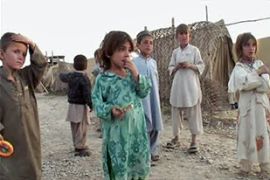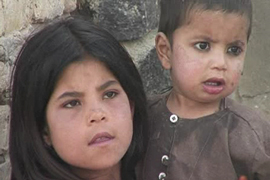Afghanistan feels refugee pressure
More than three million Afghans voluntarily repatriated from Pakistan since 2002.

‘Forced out’
James Bays, Al Jazeera’s correspondent in Afghanistan, said that the repatriation system is already stretched following Pakistan‘s April 15 deadline.
“It could reach breaking point as more camps on the Pakistani side are closed in the summer,” he said.
“Pakistan, many observers believe, has lost patience with the refugees, some of whom have been there for over 30 years.”
“It was a voluntary repatriation, but Pakistan is now making life for them so difficult that they are effectively being forced out.”
The number of returnees has averaged more than 500,000 since 2002, with 135,000 so far in 2007 according to the UNHCR.
‘Slow pace’
About 61 per cent of the returnees left from North West Frontier Province of Pakistan, 16 per cent from Balochistan, 14 per cent from Punjab and Islamabad, and nine per cent from Sindh province in the south.
More than 860,000 Afghans have also been helped home from Iran.
Kilian Kleinschmidt, UNHCR’s assistant representative in Pakistan, said: “In the last six years, this operation has seen many ups and downs, from the mass returns of 2002 to the slow pace of repatriation in 2006.”
“These fluctuating trends reflect the voluntary nature of repatriation, and we have tried our best to help Afghans make informed decisions on if and when they should go home.”
The majority of returnees from Pakistan have headed to eastern and south-eastern Afghanistan, as well as Kabul and Kunduz provinces.
‘Preferred solution’
The UNHCR works with the Afghan government and partner agencies to provide shelter assistance, income-generation and vocational training to help the most vulnerable returnees reintegrate in their home areas.
 |
| Children are forcibly being repatriated to a country they have never known |
In Pakistan, more than 2.15 million Afghans were recently registered in a government exercise that provided them with Proof of Registration (PoR) cards recognising them as Afghans temporarily living in Pakistan.
The card gives registered Afghans temporary protection up to December 2009.
Afghans who did not register themselves and do not have PoR cards were given up to April 15 to repatriate in safety and dignity with UNHCR assistance averaging $100 per person.
Now, the Pakistani government considers them illegal immigrants to be dealt with under national laws.
Kleinschmidt said: “Voluntary repatriation is the preferred solution to the protracted Afghan situation in Pakistan.”
“At the same time, there will be groups of Afghans who won’t be able to go back and will need other solutions.”